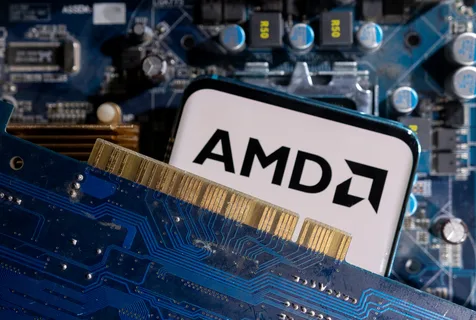Chip Stocks Decline as ASML’s Weak Outlook Sparks Concerns Over Non-AI Chip Demand

Semiconductor stocks in both the U.S. and Asia took a hit after ASML (ASML.AS), a prominent chip equipment maker, cut its annual sales forecast due to weak demand for non-AI chips. Despite strong demand for AI-related chips, such as those produced by industry giant Nvidia (NVDA.O), the broader semiconductor market is experiencing a slower recovery. This news sent ripples through the sector, dragging down major chip stocks.
Key Losses Across the Sector
Nvidia, which had recently surpassed Apple as the world’s most valuable company, saw a 4.5% drop in its stock price, wiping out approximately $158 billion from its market cap. This widened the gap with Apple, whose value sits at $3.56 trillion. Other major chip firms such as AMD (AMD.O), Intel (INTC.O), Arm, Broadcom (AVGO.O), and Micron (MU.O) fell between 3.2% and 5% by Tuesday’s close. The Philadelphia SE Semiconductor Index dropped nearly 5%, further weighing down the tech-heavy Nasdaq.
The sharp decline followed an apparent error by ASML, which prematurely released its quarterly results, revealing weak bookings and slower-than-expected recovery in chip demand, particularly outside the AI sector. This led to a 16% plunge in ASML’s U.S.-listed shares.
AI Demand vs. Broader Market Weakness
While the demand for AI chips continues to surge, fueled by growing interest in artificial intelligence and machine learning applications, other segments of the chip market remain tepid. Logic chip makers are delaying orders, and memory chip manufacturers are planning only limited new capacity expansions, which signals ongoing weakness in non-AI chip demand.
“ASML’s fat finger error isn’t cause for concern in itself, but the content of the release didn’t make comforting reading for investors,” noted Derren Nathan, head of equity research at Hargreaves Lansdown.
Asian Chipmakers Also Hit
Asian semiconductor companies, many of which are customers of ASML, also suffered losses. Taiwan Semiconductor Manufacturing Co (TSMC), Samsung Electronics, and SK Hynix all saw stock declines ranging from 2.2% to 2.5%. This further underscores concerns that the non-AI chip sector is slowing down, with chip factories having stabilized after racing to build extra capacity during the pandemic.
Samsung, which had earlier warned of disappointing third-quarter profits due to struggles in capitalizing on AI chip demand, continued to face pressure. On the other hand, TSMC, which supplies Nvidia, is expected to report a 40% jump in third-quarter profit, showcasing a more optimistic outlook for companies directly tied to AI chip production.
Geopolitical Tensions and Export Controls
Adding to market concerns, Bloomberg News reported that U.S. officials are considering placing a cap on AI chip export licenses to certain countries, particularly in the Persian Gulf. The move is driven by national security concerns that advanced American chips could be indirectly acquired by China, circumventing existing trade restrictions.
Danni Hewson, head of financial analysis at AJ Bell, remarked, “With the AI revolution expected to play such a huge part in upping productivity and enabling other technological advances, it’s not surprising the U.S. wants to do what it can to maintain its dominance.”
The combination of weak non-AI chip demand and increasing geopolitical tensions highlights the delicate balance chipmakers must navigate as they grapple with shifting market dynamics.



















